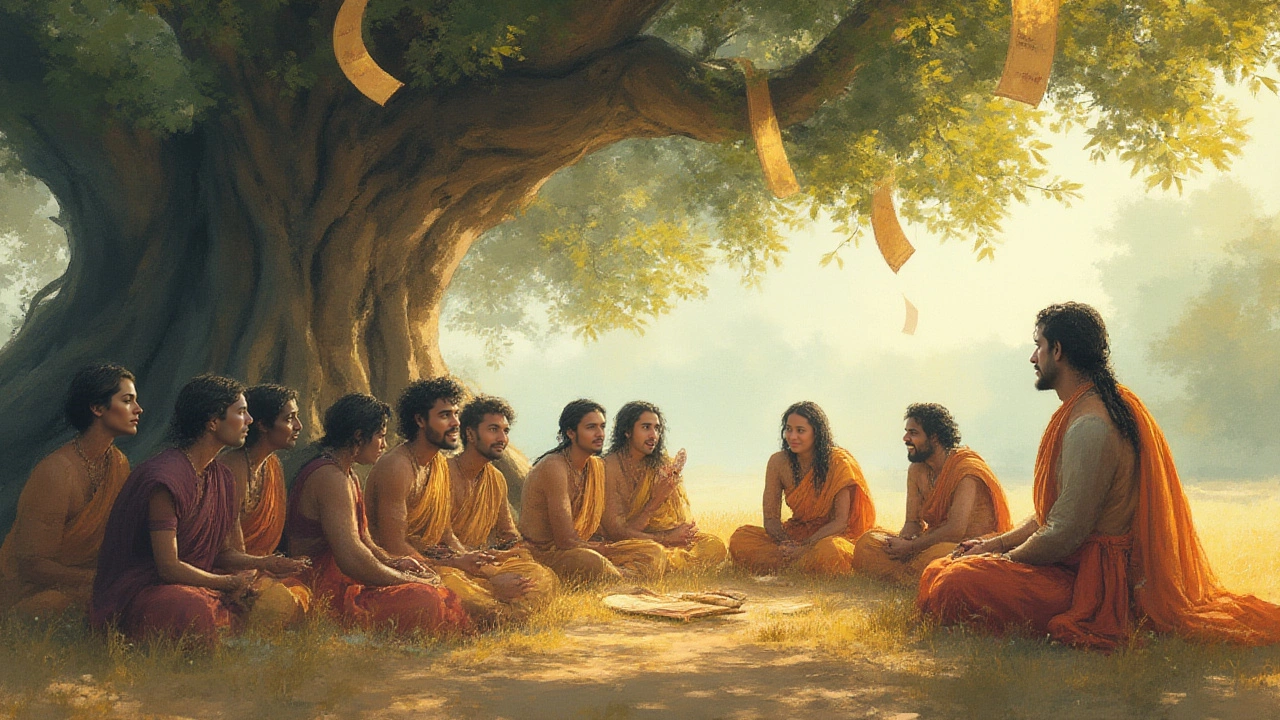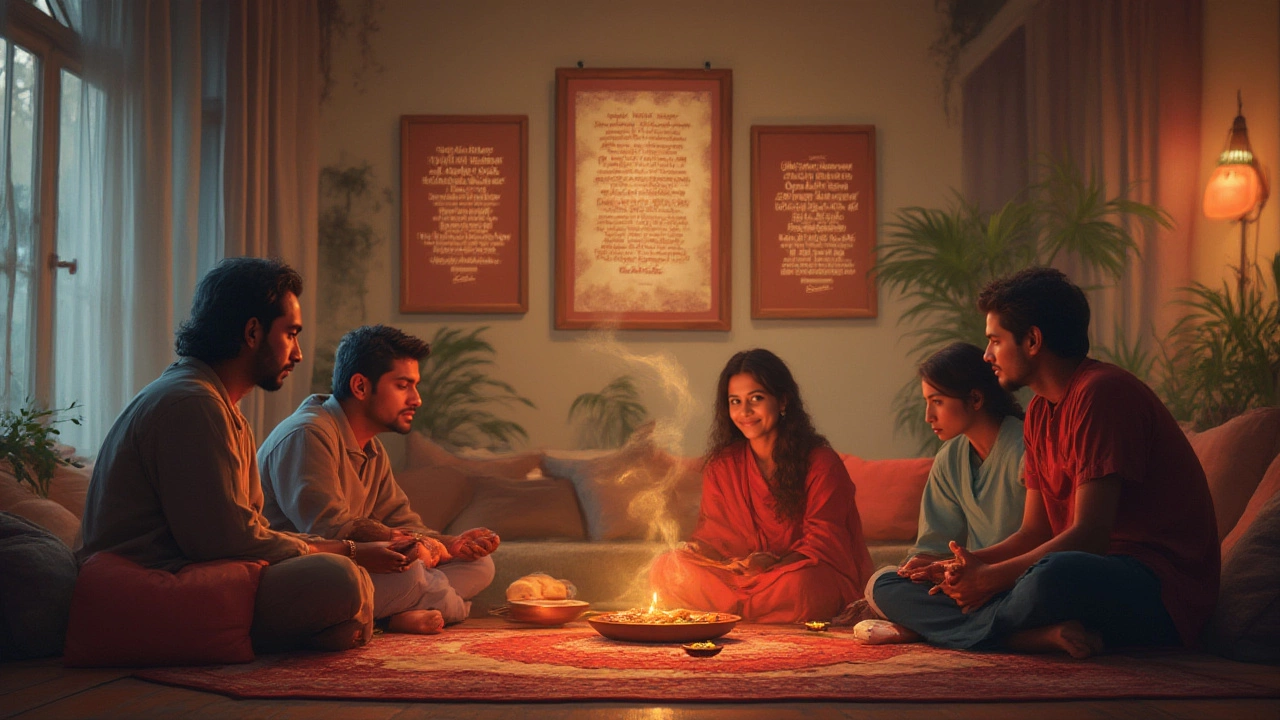Hinduism Spiritual Quotes: Wisdom, Inspiration, and Daily Life Lessons

If you’re scrolling for some words that actually hit home, Hinduism is packed with spiritual quotes that have not only survived centuries but have shaped how millions of people see themselves and the universe. We’re not talking about fortune-cookie wisdom or feel-good social media posts. These quotes come from ancient Sanskrit texts, the daily mantras of families, and conversations that dive straight into the big stuff: good, evil, the soul, purpose, and what to do when your mind is a mess. Hindu spiritual quotes sit right in that sweet spot between lofty philosophy and “you can use this right now.” And honestly, there’s something about saying these lines out loud (even when the only witness is your curious cat) that makes you pause and see your day differently.
Ancient Texts and Timeless Quotes: Where Hindu Spiritual Wisdom Comes From
The oldest spiritual quotes from Hinduism can trace their origin back to texts like the Vedas, the Upanishads, the Bhagavad Gita, and the Yoga Sutras. These aren’t books you zip through during your commute. Each is loaded with teachings, and the quotes below keep coming up for a reason—they bite through confusion and land squarely in the here and now.
The Upanishads, written between 800 and 200 BCE, are full of meditative sayings. Here’s a line that’s serious fuel for self-reflection: “As is your desire, so is your will. As is your will, so is your deed. As is your deed, so is your destiny.” What sticks about this? It’s a reminder you’re not just along for the ride; your destiny is in your hands, crafted each moment by what you truly long for. Not a bad challenge to keep in your back pocket.
Got a tough decision ahead? The Bhagavad Gita (roughly 5,000 years old, if you want to impress someone at trivia night) tells us: “You have the right to perform your actions, but you are not entitled to the fruits of your actions.” Imagine if you could actually detach from the outcome every time something stressful came up. Less anxiety, right? Here’s the real kicker—people all over the world find this idea liberating, whether they’ve ever set foot in a temple or not.
Let’s get into some serious data for a second. Did you know that the Bhagavad Gita is among the most translated spiritual books globally, with over 100 full translations into English alone? That’s not just because it’s old—it’s because lines like “When meditation is mastered, the mind is unwavering like the flame of a lamp in a windless place” (from Chapter 6) work whether you’re new to reflection or an old pro with incense sticks burning on every windowsill.
Here’s a small table that shows where some of the most-quoted Hindu sayings originate, so you can drop actual text names instead of just “something I read online”:
| Quote | Source |
|---|---|
| “Tat Tvam Asi” (“You are That”) | Chandogya Upanishad |
| “Aham Brahmasmi” (“I am Brahman / the Absolute”) | Brihadaranyaka Upanishad |
| “Let a man lift himself by himself; let him not degrade himself” | Bhagavad Gita |
| “Truth alone triumphs” (Satyameva Jayate) | Mundaka Upanishad |
These sayings are so woven into daily life in India that you’ll spot them on bank notes and emblems (yep, Satyameva Jayate is literally the national motto). But they aren’t just to be displayed; they’re tips for anyone twisted up about what’s right, who they are, or what matters most.
If you’re searching for something to hold onto—especially on days when everything feels overwhelming—try repeating, “Tat Tvam Asi.” It simply means “You are That.” No division between you and the rest of the world. It’s a game-changing perspective, and the Upanishads put it front and center long before modern therapy.

The Power of Words: How Hindu Spiritual Quotes Change Mindset
Ever heard someone say, “Change the way you look at things and the things you look at change”? That vibe runs deep in Hindu spiritual quotes. The mantra “Aham Brahmasmi” is a masterclass in this—it tells you that you already have everything you need inside you because the divine itself lives there. It’s not about ego but connection. If you ever catch yourself thinking, “Am I even enough?” this is one to repeat. Lots of meditation teachers and even psychologists encourage exactly this practice—saying positive, affirming words out loud or in your head—because it rewires your reactions and even your brain over time.
Flip to the Yoga Sutras for a second. Right at the start, a quote: “Yoga chitta vritti nirodha,” or “Yoga is the control of the fluctuations of the mind.” It’s a direct hit to anyone who’s ever had a restless brain (so, basically everyone with a smartphone). Patanjali—the author—was talking about meditative focus, but it’s also a saner way to respond to the news cycle or, in my case, Oliver launching himself at the curtains for no obvious reason.
Practice makes these spiritual sayings powerful. For instance, take the phrase “Let a man lift himself by himself; let him not degrade himself.” Instead of self-shame or comparison, it’s an invitation to rise—even on days you’d rather stay in your pajamas. A lot of modern wellness routines borrow straight from these old-school sayings, turning them into daily affirmations or meditation prompts. And people aren’t just making it up: A study from the Journal of Positive Psychology found that repeating affirming statements (even for just a week) made people feel more hopeful and more in control over their decisions.
Resilience is a word that gets thrown around a lot, but the Hindu approach reveals that it’s not about muscling through. It’s about pausing, seeing yourself as part of something bigger, and acting from that space. No wonder millions hang these quotes on walls (or just repeat them before heading into a tough meeting).
If you want a quick hack, try keeping one line from the Bhagavad Gita on a sticky note near your workspace: “Be steadfast in yoga, O Arjuna. Perform your duty and abandon all attachment to success or failure.” That one’s helped way more people get through work drama than any spreadsheet tip.
Here’s another common sight in everyday Hindu homes or temples: family elders whispering the Gayatri Mantra at sunrise, a line that praises the divine light and asks for the mind to be guided toward righteousness. It’s crazy to think this same prayer is used by athletes, students, and even people prepping before interviews.
You might even find that repeating these words changes the way you see normal frustrations. Next time you’re stuck in traffic, see if “This too shall pass; nothing is permanent” (from Buddhist and Hindu roots) lightens things up. It’s not magic, but you’ll feel the difference in your jaw, your breath, and maybe even your temper.

Making It Real: Using Hinduism Spiritual Quotes in Everyday Life
So, how do you actually apply these ancient lines to 2025, where half your day is a blur of screens, coffee, and never-ending notifications? The best Hindu quotes aren’t just for monks or yogis in mountain caves—they’re meant to land in the middle of your crazy, regular life. Here’s how you can pull that off:
- Start Your Morning with Intention: Recite (even quietly, in your head) “Satyameva Jayate”—Truth alone triumphs. It’s a rock-solid way to remind yourself to be honest, even when it’s not convenient. My morning routine, right after feeding Oliver, includes this one. Sometimes, that shapes the rest of my day better than the strongest cup of coffee.
- Handle Stressful Moments: Try “You are what your deep, driving desire is.” Instead of snapping when the printer jams or your inbox explodes, take a few breaths and repeat this. Ask yourself: What do I really want in this moment—peace or victory?
- Before Bed, Reflect with a Gita Quote: Right as your head hits the pillow, repeat “Do your duty without attachment and you will live in peace.” Ditch the endless mental replay of what you did right or wrong that day.
- Boost Courage with “Aham Brahmasmi”: When self-doubt creeps in, even five seconds of saying this phrase—“I am the Absolute”—can calm nerves and give a sense of connection.
If you want to really go next-level, write your favorite quote on a sticky note on your fridge or mirror. It can sound cheesy, but this stuff sticks better when you see it every day. Some tech folks even add it as a calendar notification at random points, so it pops up when you least expect it.
Another tip? Share it. Text the quote “When meditation is mastered, the mind is unwavering...” to a friend who’s deep in exam prep or share “Truth alone triumphs” when you notice a friend wrestling with a tough decision. These things spread real quick—and unlike jokes, spiritual quotes don’t get old.
Hindu festivals, ceremonies, and even pop-culture music all blend these lines into songs and greetings. You’ll hear “Om Shanti Shanti Shanti” (peace, peace, peace) at weddings, yoga studios, and over loudspeakers during street festivals. It’s a subtle way of centering yourself, signaling that even in big celebrations, spiritual calm still matters.
You’re probably seeing a pattern now. These ancient lines are as current as ever. Over half of young adults in India (according to a 2023 Pew Research study) turn to spiritual quotes on social media for comfort or motivation. Even outside India, apps are popping up dedicated to daily Hindu wisdom, amassing millions of downloads by people of all backgrounds.
So next time life feels too big, or way too small, grab one of these spiritual quotes. Whisper it in your car, scribble it on a scratch pad, say it to your cat (like Oliver, who seems to love "Tat Tvam Asi" because he acts like he owns the universe anyway). Whether you believe in past lives or just want something steady to hold, there’s something in these lines for anyone still figuring things out.